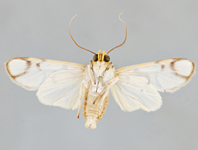Abstract
Physogastric rove beetles are usually studied in an aspect of the physogastry concept, which is defined as the enlargement of membranous parts of abdomen. This feature along with lack of the secondary sclerotization is used to differentiate physogastric from stenogastric individuals. Charles H. Seevers was the first author to record that the differences between physogastric and stenogastric rove beetles represent more than merely body size difference and that the secondary sclerotization, which occurs during the post-imaginal growth, leads to differences beyond that matter. Herein, we record the first stenogastric Corotoca specimen, and the morphological and behavioral differences of physogastric individuals are discussed. It is concluded that stenogastric individuals have features that may have useful implications for phylogenetic and taxonomic studies.
References
Audy, J.R., Radovsky, f.J. & Vercammen-Grandjean, P.H. (1972) Neosomy: Radical intrastadial metamorphosis associated with arthropod symbioses. Journal of Medical Entomology, 9, 487–494.
https://doi.org/10.1093/jmedent/9.6.487
Cai, C., Huang, D., Newton, A.F., Eldredge, K.T. & Engel, M.S. (2017) Early evolution of specialized termitophily in cretaceous rove beetles. Current Biology, 27, 1229–1235.
https://doi.org/10.1016/j.cub.2017.03.009
Caron, E., Bortoluzzi, S. & Rosa, C.S. (2018) Two new species of obligatory termitophilous rove beetles from Brazil (Coleoptera: Staphylinidae: Termitomorpha Wasmann). Zootaxa, 4413 (3), 566–578.
https://doi.org/10.11646/zootaxa.4413.3.10
Casey, Th.L. (Thomas Lincoln) (1989) v. 1 Coleopterological notices. New York Academy of Sciences, New York, 176 pp. Available from: https://www.biodiversitylibrary.org/item/37704 (accessed 20 August 2019)
Cunha, H.F. da, Lima, J.S., Souza, L.F. de, Santos, L.G.A. dos & Nabout, J.C. (2015) No Morphometric Distinction between the Host Constrictotermes cyphergaster (Silvestri) (Isoptera: Termitidae, Nasutitermitinae) and its Obligatory Termitophile Corotoca melantho Schiødte (Coleoptera: Staphylinidae). Sociobiology, 62, 65–69.
https://doi.org/10.13102/sociobiology.v62i1.65-69
Emerson, A.E. (1935) Termitophile distribution and quantitative characters as indicators of physiological speciation in British Guiana termites (Isoptera). Annals of the Entomological Society of America, 28, 369–395.
https://doi.org/10.1093/aesa/28.3.369
Fontes, L. (1977) Notes on the termitophilous genus Corotoca, with a new species from Brazil (Coleoptera, Staphylinidae). Revista Brasileira de Entomologia, 21, 69–74.
Franssen, C.J.H. (1932) Jacobsonella oudemansi n. sp und termitobia Silvestri. Tijdschrift voor Entomologie, 75, 170–174.
Hölldobler, B. & Kwapich, C.L. (2019) Behavior and exocrine glands in the myrmecophilous beetle Dinarda dentata (Gravenhorst, 1806) (Coleoptera: Staphylinidae: Aleocharinae). PLoS One, 14, e0210524.
https://doi.org/10.1371/journal.pone.0210524
Jacobson, H., Kistner, D. & Pasteels, J.M. (1986) Generic Revision, Phylogentic Classification, and Phylogeny of the Termiophilous Tribe Corotocini (Coleoptera: Staphylinidae). Sociobiology, 12, 1–239.
Kistner, D.H. (1968) A Taxonomic Revision of the Termitophilous Tribe Termitopaedini: With Notes on Behavior, Systematics, and Post-imaginal Growth (Coleoptera: Staphylinidae). Miscellaneous Publications of the Entomological Society of America, 6, 141–196.
Kistner, D.H. (1969) The Biology of Termitophiles. In: Krishna K. & Weesner, F.M. (Eds.), Biology of Termites. Academic Press, New York, pp. 525–557.
https://doi.org/10.1016/B978-0-12-395529-6.50021-0
Kistner, D.H. (1979) Social and Evolutionary Significance of Social Insect Symbionts. In: Hermann, H.R. (Ed.), Social Insects. Academic Press, New York, pp. 339–413.
https://doi.org/10.1016/B978-0-12-342201-9.50015-X
Kistner, D.H. (1982) The social insects’ bestiary. In: Hermann, H.R. (Ed.), Social insects. Academic Press, New York, pp. 1–244.
https://doi.org/10.1016/B978-0-12-342203-3.50008-4
Kistner, D.H. & Jacobson, H. (1976) New species and new records of termitophilous species from central America and Mexico with description of behavior, related glands and ultrastructure (Coleoptera: Staphylinidae). Sociobiology, 2, 1–76.
Moreira, I.E., Pires-Silva, C.M., Ribeiro, K.G., Zilberman, B. & Bezerra-Gusmão, M.A. (2019) Run to the nest: A parody on the Iron Maiden song by Corotoca spp. (Coleoptera, Staphylinidae). Papéis Avulsos de Zoologia, 59, e20195918.
https://doi.org/10.11606/1807-0205/2019.59.18
Oliveira, M.H. de, Vieira, R.V.da.S., Moreira, I.E., Pires-Silva, C.M., Lima, H.V.G. de., Andrade, M.R. de L. & Bezerra-Gusmão, M.A. (2018) “The road to reproduction”: foraging trails of Constrictotermes cyphergaster (Termitidae: Nasutitermitinae) as maternities for Staphylinidae beetles. Sociobiology, 65, 531–533.
https://doi.org/10.13102/sociobiology.v65i3.2902
Pisno, R.M., Salazar, K., Lino-Neto, J., Serrão, J.E. & DeSouza, O. (2019) Termitariophily: expanding the concept of termitophily in a physogastric rove beetle (Coleoptera: Staphylinidae). Ecological Entomology, 44, 305–314.
https://doi.org/10.1111/een.12709
Rosa, C.S., Cristaldo, P.F., Florencio, D.F., Marins, A., Lima, E.R. & DeSouza, O. (2018) On the Chemical Disguise of a Physogastric Termitophilous Rove Beetle. Sociobiology, 65, 38–47.
https://doi.org/10.13102/sociobiology.v65i1.1942
Seevers, C.H. (1957) A Monograph on The Termitophilous Staphylinidae (Coleoptera). Fieldiana, Zoology, 40, 1–334.
https://doi.org/10.5962/bhl.title.3797
Seevers, C.H. (1960) New Termitophilous Staphylinidae of Zoogeographic Significance (Coleoptera). Annual Entomological Society America, 53, 825–834.
https://doi.org/10.1093/aesa/53.6.825
Silvestri, F. (1910) Descrizione di un novo genere di Stafilinide termitofilo di Singapore. Bollettino del Laboratorio di Zoologia, 5, 59–64.
Trägärdh, I. (1907) Description of Termitonimus, a new genus of termitophilous physogastric Aleocharinae, with notes on its anatomy. Zoologiska studier tillagnade Prof. T. Tullberg, 1907, 172–190.
Vasconcellos, A., Araújo, V., Moura, F.M. & Bandeira, A. (2007) Biomass and population structure of Constrictotermes cyphergaster (Silvestri) (Isoptera: termitidae) in the dry forest of caatinga, northeastern Brazil. Neotropical Entomology, 36, 693–698.
https://doi.org/10.1590/S1519-566X2007000500009
Wagner, D.L. & Liebherr, J.K. (1992) Flightlessness in insects. Trends Ecology Evolution, 7, 216–220.
https://doi.org/10.1016/0169-5347(92)90047-F
Wasmann, E. (1903) Zur näheren Kenntnis des echten Gastverhältnisses (Symphilie) bei den Ameisen-und Termitengästen. Biologisches Zentralblat, 23, 298–310.
Wheeler, W.M. (1928) The social insects: their origin and evolution. K. Paul, Trench, Trubner, London, 470 pp.
https://doi.org/10.5962/bhl.title.140774
Zilberman, B. (2018a) New species and synonymy in the genus Corotoca Schiødte, 1853 (Coleoptera, Aleocharinae, Corotocini). Zootaxa, 4434 (3), 547–560.
https://doi.org/10.11646/zootaxa.4434.3.9
Zilberman, B. (2018b) Revisão taxonômica e análise cladística do gênero Corotoca Schiødte 1853 (Coleoptera, Staphylinidae, Aleocharinae, Corotocini). Master Dissertation, Universidade de São Paulo, São Paulo, 160 pp.
Zilberman, B. (2019) Synopsis of the genus Termitozophilus Silvestri (Coleoptera, Staphylinidae, Aleocharinae, Corotocini). Zootaxa, 4614 (1), 95–116.
https://doi.org/10.11646/zootaxa.4614.1.4
Zilberman, B. & Casari, S.A. (2018) New species of Corotoca Schiødte, 1853 from South America and description of first instar larva. Zootaxa, 4527 (4), 521–540.
https://doi.org/10.11646/zootaxa.4527.4.4
Zilberman, B., Pires-Silva, C.M., Moreira, I.E., Pisno, R.M. & Bezerra-Gusmão, M.A. (2019) State of knowledge of viviparity in Staphylinidae and the evolutionary significance of this phenomenon in Corotoca Schiødte, 1853. Papéis Avulsos de Zoologia, 59, e20195919.
https://doi.org/10.11606/1807-0205/2019.59.19

